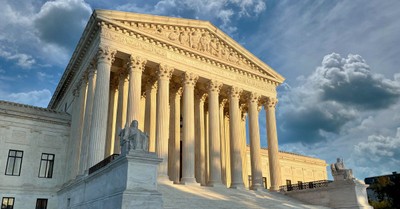SCOTUS Decides Whether Christian Counselors Will Be Able to Help Children
BreakPoint Daily Commentary


Audio By Carbonatix
By John Stonestreet, Crosswalk.com
Yesterday, the Supreme Court heard oral arguments in Chiles v. Salazar, a case with profound implications for free speech rights, as well as for those with gender dysphoria. Kaley Chiles is a licensed counselor in Colorado. Represented by the Alliance Defending Freedom, she sued the state of Colorado over its counseling censorship law, which prohibits counselors from helping clients, specifically children, reconcile their identity with their sex through talk therapy. As the law stands, counselors like Chiles face fines up to $5,000 for each violation.
Chiles claims that she has patients who want to discuss issues that “implicate Christian values about human sexuality and the treatment of their own body” while avoiding harmful drugs and questionable medical procedures. Though Chiles does not guarantee to clients that issues relating to gender identity, gender roles, and sexual attraction will be fully resolved, “she believes clients can accept the bodies that God has given them and find peace.” Chiles contends that Colorado’s law amounts to censorship and violates her First Amendment rights by muzzling her right to speak from her deeply held beliefs. It restricts her from having conversations that her clients want to have about their struggles with sexuality and identity.
Colorado claims that its ban on so-called “conversion therapy” is based on “overwhelming evidence that efforts to change a child’s sexual orientation or gender identity are unsafe and ineffective.” In making this claim, the state relies on studies with little follow-up on the subjects of their research and which are based on self-reporting, which can be problematic. In contrast, the U.K.’s Cass Review and a review from the U.S. Department of Health and Human Services have exposed the overall lack of evidence to support the effectiveness of gender dysphoria “treatments,” such as cross-sex hormones, puberty blockers, and surgical removal of healthy body parts.
According to ADF Chief Legal Counsel Jim Campbell, who argued the case before the Supreme Court yesterday,
There is a growing consensus around the world that adolescents experiencing gender dysphoria need love and an opportunity to talk through their struggles and feelings. Colorado’s law harms these young people by depriving them of caring and compassionate conversations with a counselor who helps them pursue the goals they desire.
In other words, Colorado only permits counselors to have conversations with children that affirm the state’s view of “gender identity” and which serve “gender affirmation.” For Colorado, “affirming” means encouraging a child to “transition” away from his or her God-given sex through chemicals, hormones, and surgery, which can leave permanent damage. Yet Colorado bans counselors from helping children who want to become comfortable with their bodies, calling it “conversion therapy.” In effect, Colorado is co-opting professional counseling conversations to impose gender ideology on therapists.
This case will determine whether Christian counselors can continue to help individuals, including children, who are struggling with their identity as male or female. More than 50 friend-of-the-court briefs were filed with the Supreme Court for this case, from federal and state officials, counseling groups, people who have “de-transitioned,” mental-health researchers, and families who rely on counseling to help their children.
Free speech advocates also weighed in, given the implications of this case for interpreting the First Amendment. As Campbell insists, “The government has no business censoring private conversations between clients and counselors.” That’s exactly what this law does.
It’s always dangerous to predict how the Supreme Court will decide a particular case, but most of the Justices seem poised to rule against Colorado and in defense of free speech. At the center of the debate is whether professional speech can be, as Colorado wishes, walled off from the First Amendment. In fact, strictly speaking, this case is not about medical treatments.
The talk therapy that Chiles provides consists of voluntary conversations between her and her patients. In other words, this is not about conduct, which states often have more leeway to regulate. It is about pure speech. Professional speech is no less protected by the First Amendment than other kinds of speech. On this ground alone, the Supreme Court should reject Colorado’s attempt to control and co-opt voluntary professional conversations.
Deciding for Colorado would not only require overturning precedent about speech rights but would also turn professional speech into a government playground for censorship. Thankfully, the justices do not seem to be willing to take that risk. Let’s hope and pray as much.
This Breakpoint was co-authored by Ian Speir.
Image credit: ©Getty Images/Douglas Rissing
John Stonestreet is President of the Colson Center for Christian Worldview, and radio host of BreakPoint, a daily national radio program providing thought-provoking commentaries on current events and life issues from a biblical worldview. John holds degrees from Trinity Evangelical Divinity School (IL) and Bryan College (TN), and is the co-author of Making Sense of Your World: A Biblical Worldview.
The views expressed in this commentary do not necessarily reflect those of CrosswalkHeadlines.
BreakPoint is a program of the Colson Center for Christian Worldview. BreakPoint commentaries offer incisive content people can't find anywhere else; content that cuts through the fog of relativism and the news cycle with truth and compassion. Founded by Chuck Colson (1931 – 2012) in 1991 as a daily radio broadcast, BreakPoint provides a Christian perspective on today's news and trends. Today, you can get it in written and a variety of audio formats: on the web, the radio, or your favorite podcast app on the go.




